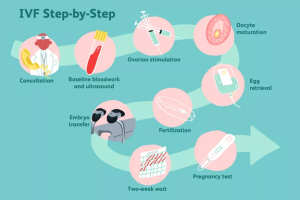Introduction
Many couples in Nigeria hope to start a family due to the social and cultural clime. On this path, infertility might occasionally provide a challenge. Millions of people have benefited from the well-established method of in vitro fertilization (IVF).

Source: iLEXX/Getty Images/ iSTOCK
As awareness and acceptability of assisted reproductive technologies rise, so do the potential and challenges within the Nigerian setting. About 20–25% of Nigerian couples suffer from infertility, which frequently carries a heavy societal stigma. The introduction of IVF was a vital development because childlessness can result in significant mental and social stress. The need for fertility treatments has significantly increased since the 1990s (birth of Nigeria’s first IVF child).
In response to this expanding demand, contemporary fertility clinics have sprung up all over large cities, providing a variety of services. In recent years, in-vitro fertilization (IVF) has emerged as a beacon of hope for many Nigerian couples battling infertility.
Wellahealth Technologies examines IVF, including its procedure, success rates, and things to consider for Nigerian patients wishing to use it.
What is IVF?
In vitro fertilization (IVF) is a set of medical techniques used to fertilize an egg outside of the body using sperm. After fertilization, the embryo (fertilized egg) is placed into the uterus to grow and develop into a baby.
The Process of IVF

There are usually multiple steps involved in the IVF process:
- Suppressing natural menstrual cycle and ovulation stimulation: A medication is administered to you that will inhibit your normal menstrual cycle and increase the efficacy of the medicines used in the subsequent phase of treatment. Then the ovaries are stimulated using medications to create an increased number of eggs.
- Egg retrieval: Mature eggs are extracted from the ovaries surgically, the procedure is done under ultrasound supervision. It involves the insertion of a needle into the vagina and into each ovary to harvest eggs while the woman is anaesthetized.
- Sperm retrieval: The male partner provides a sample of semen for collection or the donor’s sperm is used.
- Fertilization: The sperm then fertilizes eggs in a lab environment to create embryos.
- Embryo culture: The embryos are watched over and given a few days to mature. Before being placed into the womb, the fertilized eggs (embryos) grow for a maximum of six days in the laboratory; the best one or two embryos will be selected for the transfer.
- Embryo transfer: Women undergoing this procedure are given hormone medications following egg collection to aid in preparing the lining of their womb to receive the embryo. This is typically administered as a gel, an injection, or a pessary that is inserted into the vagina. For embryo transfer procedure, the woman’s uterus is filled with one or more viable embryos as this is done using a thin tube called a catheter that’s passed into the vagina.
- Pregnancy test: To ascertain whether implantation was successful, a pregnancy test is carried out a few weeks following embryo transfer. Because of the anxiety associated with not knowing if the treatment has been effective, this two-week wait can be quite challenging. It can be the most difficult aspect of treatment for some people.
Sadly, IVF doesn’t work very well most of the time, so couples or those doing this procedure are usually advised to be ready for it. If treatment is unsuccessful, you can attempt again, but we advise that you shouldn’t jump right into it.
Why IVF Fails?
Several factors influence the success rate of IVF, such as:
- The women’s age (younger ages (under 35) have better success rates)
- The cause of infertility
- Sperm and egg quality
- The number of embryos that were transferred
What to Consider Before IVF in Nigeria
Before embarking on the fertility journey, there are things you must consider and put at the forefront before starting the journey of parenthood through IVF. IVF can be a fruitful route to starting a family if done correctly, with financial and emotional support as well as appropriate information.
- Diagnostic tests: Fertility clinics usually perform diagnostic tests to determine the underlying reason for infertility. Some of these tests include ovarian reserve assessment, sperm analysis, infectious illness screening, and gynaecological endoscopy.
- Lifestyle modification: Although in vitro fertilization is a medical process, a comprehensive health and well-being strategy is crucial. It will be advantageous to keep up a healthy lifestyle with nutrition and exercise.
- Specialist consultation: It’s crucial to speak with a licensed reproductive specialist if you’re thinking about doing IVF in Nigeria. In Vitro Fertilization is not a one-size-fits-all procedure, every couple experiences infertility for different reasons. An experienced fertility specialist in Nigeria will customize the IVF procedure to each couple’s unique set of issues.
- Price: IVF is a potentially costly process. There are numerous fertility clinics in Nigeria charging from #1,000,000 per cycle depending on the location. It is important to be financially ready for the journey as the need for specialized care and advanced technologies, which are frequently not covered by health insurance, is what drives this high cost.
- Legal aspects: In Nigeria, surrogacy is prohibited under Nigerian Law, in April 2024 as stated by a lawyer and reported by the Guardian Newspapers. Investigate and comprehend every facet of IVF law in Nigeria.
- Emotional support: IVF can be emotionally taxing. Having a solid network of allies is essential.
Conclusion
At Wellahealth, we understand the desire to build a family. While we may not directly provide IVF treatment ourselves, we can be a resource for health information and support. We encourage you to explore our health insurance plans to see if any offer coverage related to general health consultations, laboratory tests for common illnesses, or medications (depending on the plan ) for you and your family.
Send us a message on WhatsApp today!
Dr. Ifeoma M. Uduh, Dr. John Afam






